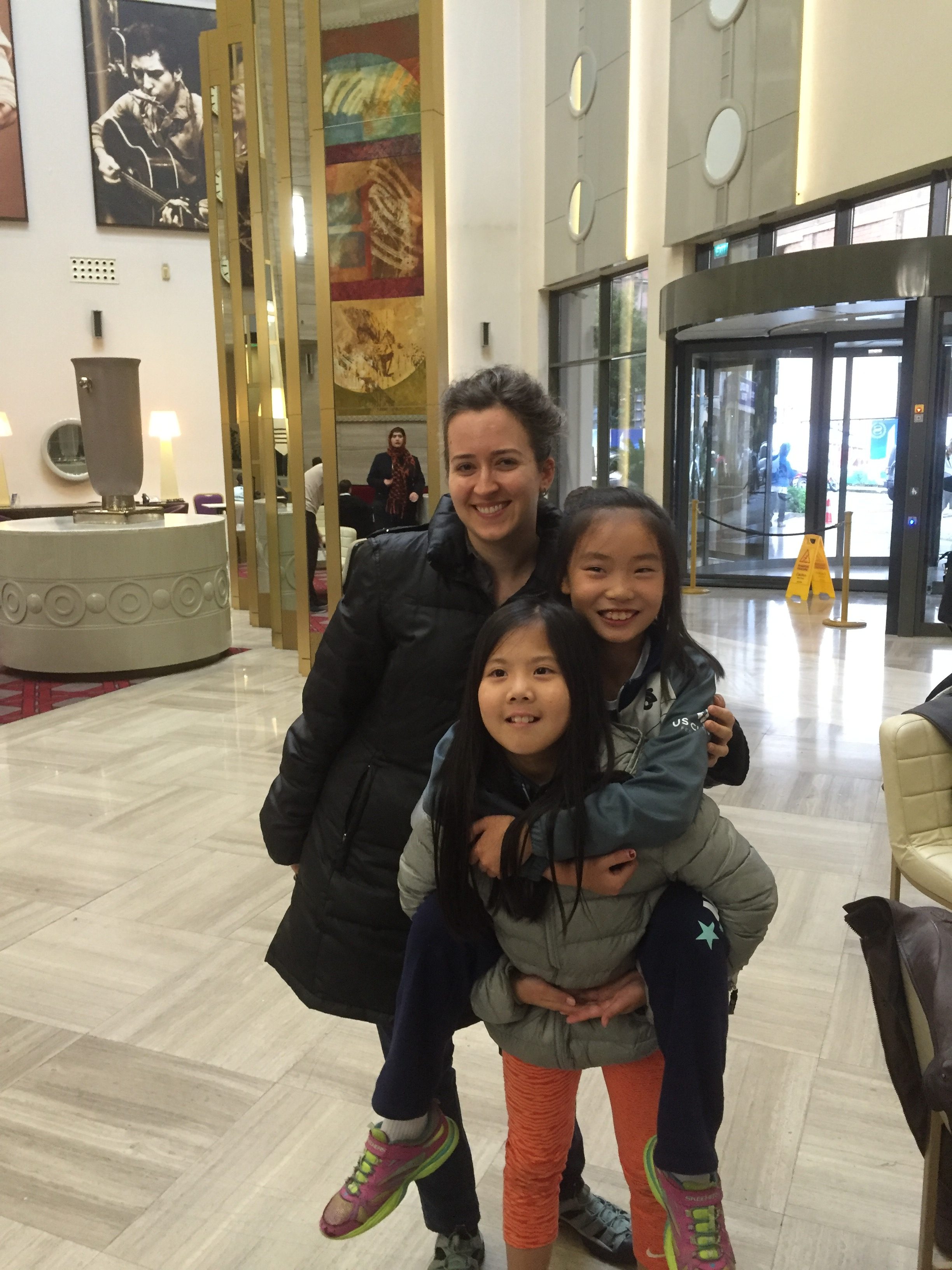 GM Irina Krush, with gold medalist Rochelle Wu carrying Tianna Wang
GM Irina Krush, with gold medalist Rochelle Wu carrying Tianna Wang I'm sure that everyone by now knows that the US team did AMAZING in Batumi, winning two gold and one silver medal from six sections! Both our gold medal winners, Rochelle Wu in Girls U-10 and Nikhil Kumar in Open U-12, went on a tear after my mid-tournament report following round 6. After the free day, Nikhil won four consecutive games to guarantee first place with one round to go. Rochelle drew for the last time in round 7, then took four games en route to the title. This was in fact Nikhil's first World Youth Championship, and he must be entering a very small group of those who've managed to win it on their first attempt! Nikhil, who lives in Miami, said he did not come into the tournament expecting to win (He started out as the 25th seed, close to 400 points lower than the top seed R. Praggnanandhaa), but that his confidence grew as the tournament progressed. Indeed, that trajectory is visible through his games; Nikhil survived a completely losing position in round 2, and even won a much worse position in round 3. In the second half, Nikhil didn't need that sort of luck to accumulate points.
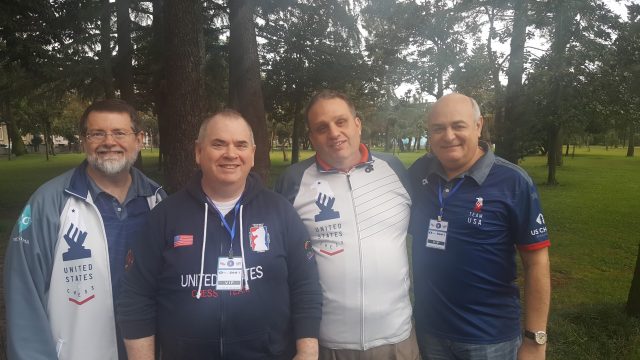 Jerry Nash of US Chess and Official Team USA coaches: Fide Senior Trainer Aviv Friedman, GM Ben Finegold and FIDE Senior Trainer Michael Khodarkovsky.
Jerry Nash of US Chess and Official Team USA coaches: Fide Senior Trainer Aviv Friedman, GM Ben Finegold and FIDE Senior Trainer Michael Khodarkovsky.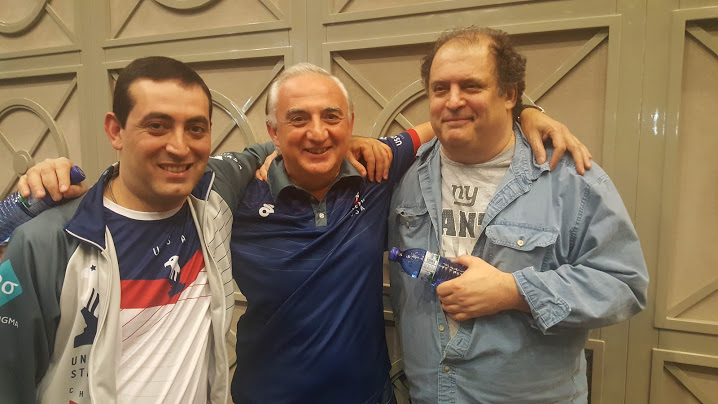 Our much appreciated coaching squad also included IMs Andranik Matikozyan, Armen Ambartsoumian and GM John Fedorowicz
Our much appreciated coaching squad also included IMs Andranik Matikozyan, Armen Ambartsoumian and GM John Fedorowicz He was certainly helped by a good grounding in the openings he plays; in a Facebook post, his father Alok mentioned GM Boris Avrukh as one of the coaches who's helped him with his opening repertoire and that work was evident in Batumi. Let's see how easily Nikhil dismantles the uncertain opening play of his compatriot Andy Huang in round 6:
[pgn] [Event "World Cadets Championship U12B"] [Site "?"] [Date "2016.10.24"] [White "Kumar, Nikhil"] [Black "Huang, Andy"] [Result "1-0"] [ECO "D11"] [WhiteElo "2076"] [BlackElo "2152"] [PlyCount "65"] [EventDate "2016.??.??"] 1. d4 d5 2. c4 c6 3. Nf3 Nf6 4. e3 {The system recommended in Boris Avrukh's "Grandmaster Repertoire", volume 1.} e6 5. b3 Nbd7 6. Bb2 b6 7. Nbd2 {A slight deviation from Avrukh's book, which considers 7.Bd3 the main line, saving the decision of where to put the knight (c3 or d2) for later.} Be7 8. Bd3 Bb7 9. O-O h6 {It's not exactly clear what is the purpose of this move.} 10. Qe2 Rc8 11. e4 $1 {White carries out the thematic break.} dxe4 12. Nxe4 Nxe4 (12... O-O {seems more to the point.}) 13. Bxe4 Nf6 14. Bc2 Rc7 {Black is already in significant difficulties, but this plan doesn't help.} ({Now Black was probably afraid to} 14... O-O {because of} 15. Qd3 {with d5 ideas on the horizon.}) 15. Rad1 Qa8 16. Qd3 c5 {Diagram [#]} (16... O-O {always runs into} 17. d5 $1 {winning.}) 17. d5 $1 {Of course, White opens the center.} exd5 18. cxd5 Rd7 (18... Bxd5 19. Bxf6 Bxf3 20. Bxg7 Rg8 21. Qh7 $18) 19. Ne5 Rxd5 20. Qg3 {Black still does not have the chance to castle.} Rxd1 (20... O-O 21. Rxd5 Bxd5 22. Nd7 $18) 21. Rxd1 Bd5 22. b4 $1 {Noticing a way in for the bishop.} Rg8 23. Ba4+ Kf8 24. bxc5 bxc5 25. Bb3 c4 26. Nxc4 Ne4 27. Qe5 Be6 28. f3 Nf6 29. Ba3 Qb7 30. Rd8+ Ne8 31. Ba4 Qb1+ 32. Kf2 Qxa2+ 33. Kg3 1-0[/pgn]
A similar game occurred in round 8: again White got an edge from the opening and exploited it energetically. [pgn] [Event "World Cadets Championship U12B"] [Site "?"] [Date "2016.10.27"] [White "Kumar, Nikhil"] [Black "Ozenir, Ekin Baris"] [Result "1-0"] [ECO "E44"] [WhiteElo "2076"] [BlackElo "2133"] [PlyCount "65"] [EventDate "2016.??.??"] 1. d4 Nf6 2. c4 e6 3. Nc3 Bb4 4. e3 b6 5. Nge2 c5 6. a3 Ba5 7. Rb1 Na6 8. Bd2 O-O 9. Nf4 d6 10. Bd3 Bb7 11. O-O Bxc3 12. Bxc3 cxd4 13. exd4 { We can start from here.} d5 14. b3 $1 {of course, not taking on an isolated pawn.} Qd6 15. Nh5 Qe7 16. c5 $1 {seizing the chance to initiate play on the other side of the board.} Nxh5 (16... bxc5 17. dxc5 Nxc5 18. Bxf6 gxf6 19. Qg4+ Kh8 20. Qg7#) 17. Qxh5 g6 18. Qh6 bxc5 19. dxc5 f6 20. c6 Bc8 21. b4 Rd8 22. b5 Nc7 23. Rb4 $5 {Nikhil goes for an aggressive rook lift, although the simple a4-a5-b6 looked very effective.} e5 24. Rh4 {Bxg6 is the threat.} Bf5 (24... Qg7 25. Qxg7+ Kxg7 26. Ba5 $18 {trouble comes from the other side of the board.}) 25. Bxf5 gxf5 26. f4 $1 Nxb5 27. fxe5 $1 {White's attack is strong enough to allow the bishop to be taken.} Nxc3 28. exf6 Ne2+ 29. Kh1 Qc7 30. Rxf5 Rab8 31. Rb4 Kh8 32. f7 Qe7 33. Rxb8 1-0[/pgn]
Nikhil got his biggest test in round 9, when he was paired with the Indian IM Praggnandadha. We did not get to see much of a battle in this one, as the Indian boy made a surprising tactical mistake right out of the opening and lost two pawns. [pgn] [Event "World Cadets Championship U12B"] [Site "?"] [Date "2016.10.28"] [Round "9.1"] [White "Kumar, Nikhil"] [Black "Praggnanandhaa, R."] [Result "1-0"] [ECO "D35"] [WhiteElo "2076"] [BlackElo "2442"] [PlyCount "99"] [EventDate "2016.??.??"] 1. d4 Nf6 2. c4 e6 3. Nc3 d5 4. cxd5 exd5 5. Bg5 Be7 6. e3 c6 7. Bd3 Nbd7 8. Qc2 Nh5 9. Bxe7 Qxe7 10. Nge2 Nhf6 11. O-O Nf8 12. a3 Ne6 13. Rad1 O-O 14. f3 c5 15. dxc5 Qxc5 16. Nxd5 Nxd5 17. Bxh7+ Kh8 18. Qxc5 Nxc5 19. Rxd5 Kxh7 20. Rxc5 b6 21. Rc2 Ba6 22. Rd1 Bxe2 23. Rxe2 Rac8 24. Rd7 a5 25. Red2 Rc6 26. Kf2 a4 27. Ke2 f6 28. Ra7 b5 29. e4 Rfc8 30. h4 Rc2 31. Rad7 Rc1 32. Ke3 Rg1 33. R7d5 Rb8 34. Kf4 Rc1 35. Rd7 b4 36. Ra7 b3 37. Rxa4 Rc2 38. Rad4 Rbc8 39. Ke3 Rc1 40. R4d3 Rb8 41. g4 Rh1 42. h5 Re1+ 43. Kf4 Rc1 44. Rd5 Rc2 45. Ke3 Rc1 46. a4 Ra1 47. Rb5 Rc8 48. Rd4 Re1+ 49. Kf4 Rc2 50. Rxb3 1-0[/pgn]After this Nikhil began to believe he could win the whole thing. Nikhil defeated Andrew Hong in round 10 using his trusty Caro-Kann, again emerging better from the opening (trivia question: Nikhil Kumar employed the Caro-Kann four times in Batumi; what was his score with it?). And by that point he had the title wrapped up, with an impressive score of 9/10!
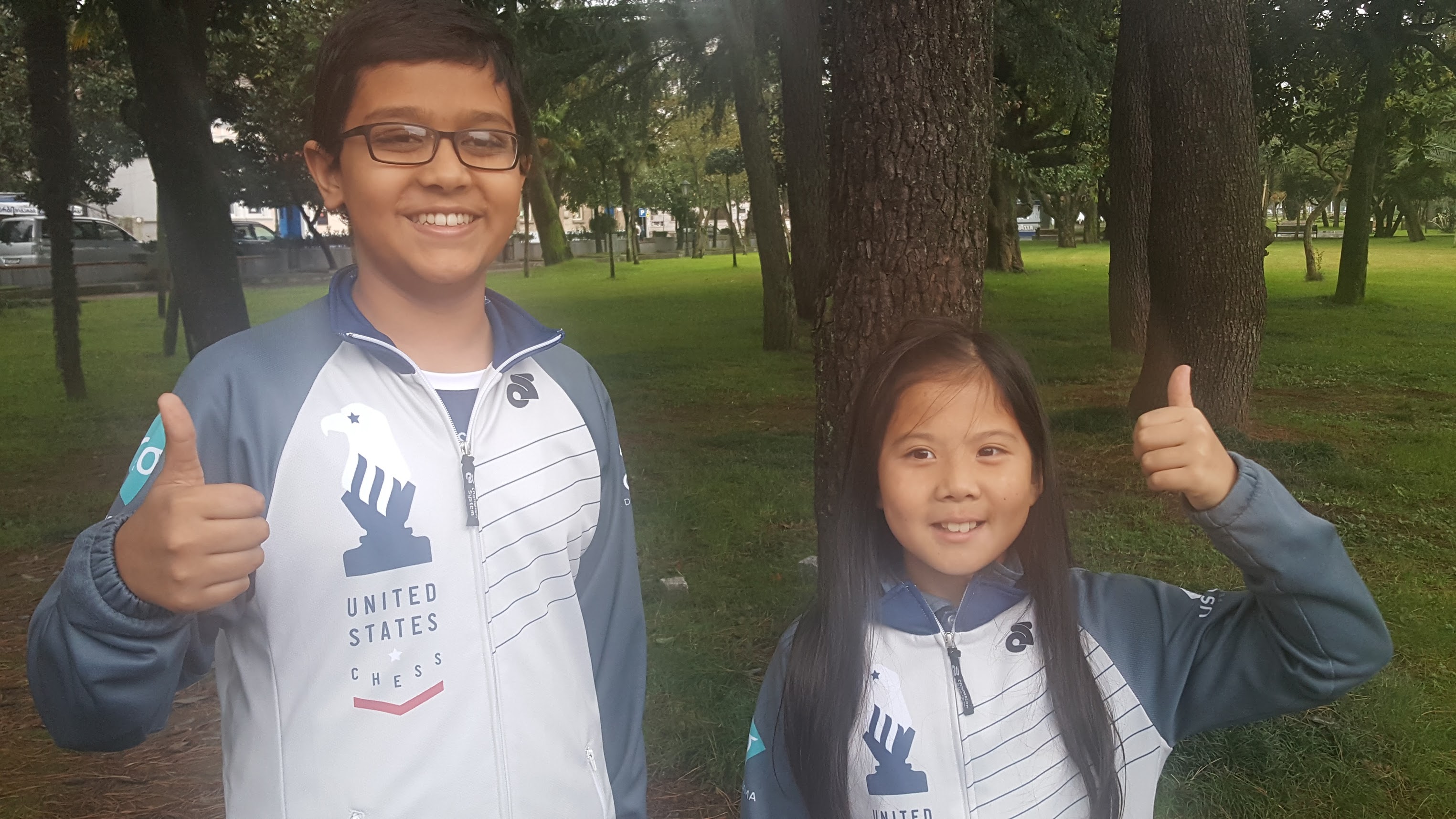 Our gold medalists Kumar and Wu
Our gold medalists Kumar and WuDespite his “positional” opening repertoire (1.d4 as White and the Caro-Kann as Black), Nikhil showed that he was ready to sharpen the play whenever appropriate, and took advantage of the tactical opportunities that came his way. He may have been underestimated by his opponents as well- he said that out of 11 games, he never received a single draw offer. By the time they realized they needed to be careful with him, he had already won the tournament :) Andrew Hong had an excellent tournament, starting with 5/5 and playing on the top boards the whole way. He played seeds 1,3,4 and 5 (everyone higher than him with the exception of Javokhir Sindarov). His only loss came to Nikhil in round 10, after which he bounced back with a critical win in the last round to win the silver medal on tiebreaks. Here is his win against Vincent Keymer of Germany.
[pgn] [Event "World Cadets Championship U12B"] [Site "?"] [Date "2016.10.23"] [Round "5.2"] [White "Hong, Andrew Z"] [Black "Keymer, Vincent"] [Result "1-0"] [ECO "B90"] [WhiteElo "2296"] [BlackElo "2402"] [PlyCount "129"] [EventDate "2016.??.??"] 1. e4 c5 2. Nf3 d6 3. d4 cxd4 4. Nxd4 Nf6 5. Nc3 a6 6. h3 e5 7. Nde2 h5 8. g3 Be6 9. Bg2 Nbd7 10. a4 Rc8 11. O-O Be7 12. b3 Nc5 13. a5 b6 14. axb6 Qxb6 15. Bg5 O-O 16. Qd2 Rfd8 17. Qe3 Re8 18. Rfd1 Nfd7 19. Bxe7 Rxe7 20. Kh2 Nf6 21. f4 exf4 22. Qxf4 Rd7 23. Rd2 Rcd8 24. Rf1 Re8 25. Qg5 Qd8 26. Qf4 a5 27. Rfd1 Nb7 28. Rf1 Qb6 29. Qg5 Qd8 30. Qf4 Qe7 31. Nd4 Rc8 32. Na4 Rdd8 33. Nb6 Rc5 34. Nd5 Bxd5 35. exd5 Qe5 36. Qxe5 dxe5 37. Nc6 Re8 38. d6 Nd8 39. d7 Rf8 40. Ne7+ Kh7 41. Rf5 Kh6 42. Bf3 Rc3 43. g4 Ne6 44. Nd5 Rxf3 45. Rxf3 Nxd7 46. Rf1 hxg4 47. hxg4 Ndc5 48. Re2 f6 49. Kg3 Re8 50. Ra1 Rd8 51. Ne7 Nf4 52. Rh2+ Kg5 53. Re1 Rd6 54. Nf5 Rd7 55. Nh4 Nce6 56. Nf3+ Kg6 57. Rxe5 fxe5 58. Nxe5+ Kg5 59. Nxd7 Nd4 60. Rd2 Nde2+ 61. Kf3 Ng1+ 62. Kf2 Ngh3+ 63. Kg3 Ng1 64. Nc5 Nge2+ 65. Kf3 1-0[/pgn]Like Nikhil, Rochelle also entered the second half having a lot of work to do. She got her winning streak started with this convincing win:
[pgn] [Event "?"] [Site "?"] [Date "2016.10.28"] [Round "?"] [White "Wu, Rochelle"] [Black "Shohradowa , Lala"] [Result "1-0"] [ECO "D76"] [PlyCount "98"] [SourceDate "2016.09.15"] 1. d4 Nf6 2. c4 g6 3. g3 Bg7 4. Bg2 d5 5. cxd5 Nxd5 6. Nf3 Nb6 7. O-O O-O 8. Nc3 Nc6 9. e3 e5 10. dxe5 Nxe5 11. Nxe5 Qxd1 12. Rxd1 Bxe5 13. f4 Bg7 14. e4 Bg4 15. Re1 Rad8 16. e5 c6 17. Be3 f6 18. h3 Bc8 19. exf6 Bxf6 20. Rad1 Rxd1 21. Rxd1 Nc4 22. Bc5 Re8 23. Ne4 Bxb2 24. Bxa7 Bf5 25. Nc5 Ra8 26. Nxb7 Rxa7 27. Bxc6 Nb6 28. Rd8+ Kg7 29. g4 Be6 30. Nd6 Rxa2 31. Re8 Bd4+ 32. Kf1 Bc4+ 33. Nxc4 Nxc4 34. Bd5 Rf2+ 35. Ke1 Rxf4 36. g5 h5 37. Rg8+ Kh7 38. Rc8 Ne5 39. Rc7+ Kh8 40. Rc8+ Kg7 41. Rg8+ Kh7 42. Rc8 Nf3+ 43. Bxf3 Rxf3 44. Rc7+ Bg7 45. h4 Rf4 46. Ke2 Rxh4 47. Kf3 Rg4 48. Rc5 Rg1 49. Kf2 Bd4+ 1-0[/pgn]She continued eliminating all the girls who'd been on the top boards from the beginning. Coming into the last round, she was already half a point ahead of the field, but only a win would guarantee her first place. Let's see that key game:
[pgn] [Event "World Cadets Championship U10G"] [Site "?"] [Date "2016.10.30"] [Round "11.1"] [White "Cherepanova, Evita"] [Black "Wu, Rochelle"] [Result "0-1"] [ECO "A48"] [WhiteElo "1561"] [BlackElo "1714"] [PlyCount "92"] [EventDate "2016.??.??"] 1. d4 Nf6 2. Nf3 g6 3. Bf4 Bg7 4. e3 O-O 5. Be2 d6 6. h3 Nc6 7. O-O e5 8. Bh2 Nd7 9. c4 f5 10. Nc3 h6 11. dxe5 dxe5 12. Qd5+ Kh7 13. Rfd1 Qe7 14. Qd2 Nc5 15. Nd5 Qf7 16. Rab1 e4 17. Nd4 Nxd4 18. exd4 Ne6 19. Be5 c6 20. Bxg7 Qxg7 21. Nc3 Rd8 22. d5 cxd5 23. cxd5 Nc7 { I remember being concerned about Black's position here. The long term prospects for Black's king didn't seem good.} 24. Qe3 (24. f3 $1 {It was important for White to start undermining Black's space.}) 24... Rd6 (24... Ne8 $1 {since knights are the best blockaders of passed pawns.}) 25. Qc5 Qd7 26. Rbc1 b6 27. Qc4 $2 {Simply a bad square for the queen, allowing Ba6 with tempo.} (27. Qa3 {would retain the pressure.}) 27... Ba6 28. Qd4 $2 (28. Qb3 $1 {was a better square for the queen- from there the queen has access to f7.} Bxe2 29. Nxe2 Nxd5 (29... Rxd5 30. Rxd5 Nxd5 31. Rd1 Rd8 32. Nc3 $18) 30. Rc2 Rd8 31. Rcd2 Qc6 32. Nf4 e3 ( 32... Nxf4 33. Qf7+ Kh8 34. Rxd6 Rxd6 35. Qf8+ $18) 33. Rxd5 Rxd5 34. Nxd5 e2 35. Re1 Qxd5 36. Qxd5 Rxd5 37. Rxe2 $11) 28... Bxe2 29. Nxe2 Nxd5 {Black has won the important passed d-pawn for no compensation and Rochelle does not allow her opponent back into the game.} 30. Qe5 (30. Rc2 Rd8 31. Rcd2 Qe7) 30... Re8 31. Qh2 f4 32. a3 e3 33. f3 Rd8 (33... Nc3 $3 34. Nxc3 Rxd1+ 35. Rxd1 Qxd1+ 36. Nxd1 e2 {would have a nice way to win the game.}) 34. Re1 Qf5 35. Nd4 Qf6 36. Nb5 R6d7 37. Nc3 Nxc3 38. bxc3 Rd2 39. Kf1 Qe5 40. Kg1 e2 41. Qh1 Qe3+ 42. Kh2 Qf2 43. Qg1 Qxg1+ 44. Kxg1 Rd1 45. Kf2 Rxc1 46. Rxc1 Rd1 0-1[/pgn]
I asked Rochelle's father, Lizhi Wu, what was the secret to Rochelle's success in Batumi. At the moment, another parent, a friend of his, was standing nearby and offered his insight: “a good daddy!”. This made everyone smile, but it's completely true: many factors have to come together for a child to be successful in chess, but the over arching requirement is parental support, and in chess, that often comes from fathers, whether they play chess or not. His friend continued, “Tell her how many hours you spend driving to tournaments.” 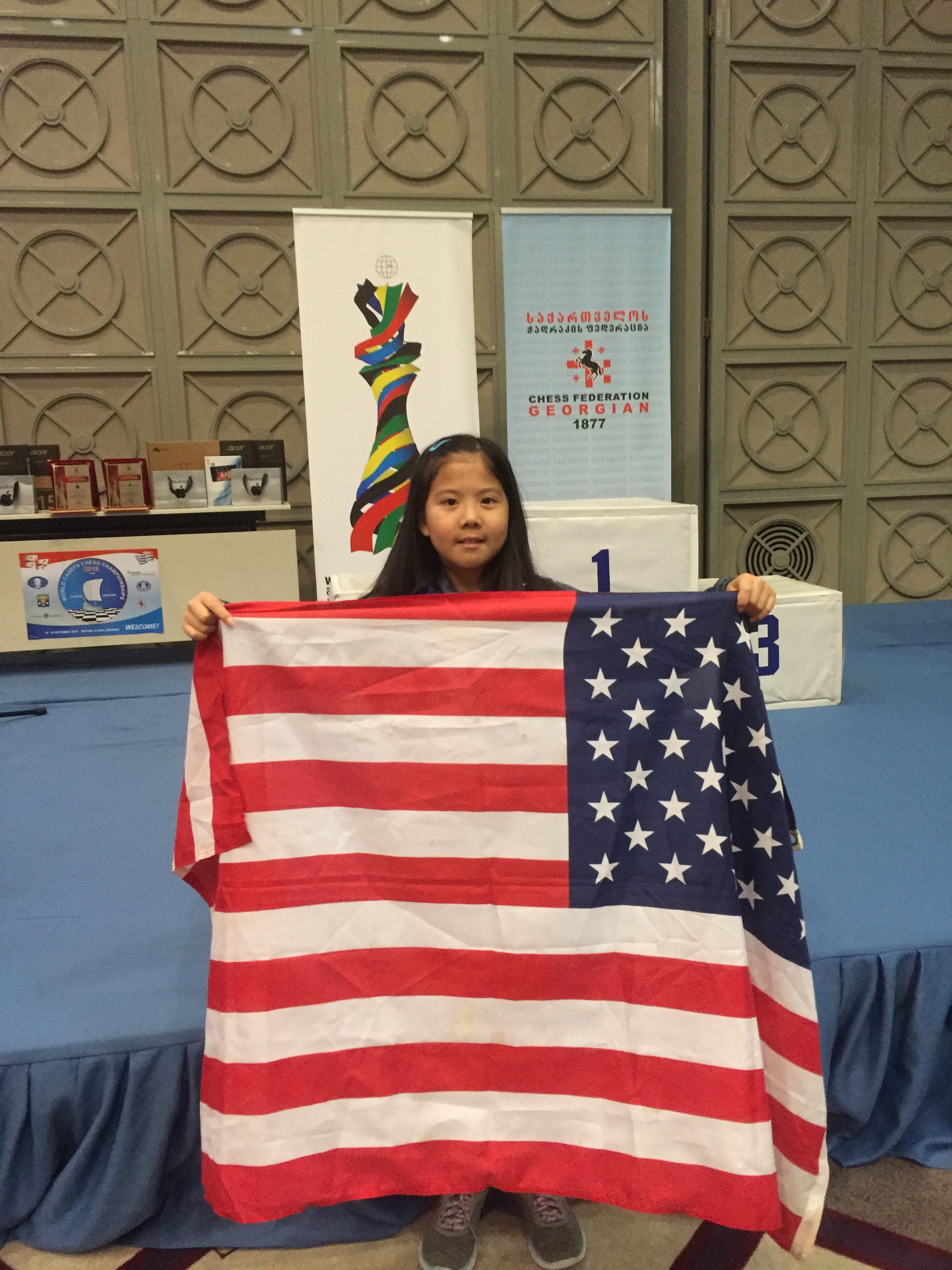 As our readers may remember from my introductory report, Rochelle hails from Alabama; Birmingham, Alabama to be precise, the largest city in the state...with a population of just over 212,000! (For some interesting facts on Birmingham, take a look at this link) There are few tournaments for Rochelle to play in in Alabama, so on a weekly basis she travels to nearby states to play. In the two weekends prior to the World Youth she played in: Atlanta, Georgia (146 miles from Birmingham) Winston Salem, North Carolina (464 miles away from Birmingham, a drive of 7 hours!) Summer tournaments of Rochelle's include the Indianopolis Open, 480 miles away and the Ocala Summer Classic in Florida, 510 miles away. Lizhi's friend half- joked that he should have a gas credit card. Despite these distances, Rochelle is playing in tournaments every week. It's an incredible amount of dedication, and probably just studying her tournament history on uschess.org is enough to understand why she became a World Champion in Batumi. GM John Fedorowicz, who worked with Rochelle in Batumi, said that Rochelle “has a good personality, isn't nervous, and is a lot of fun. She's tough.” Indeed, the seriousness and determination that emanate from her when she sits at the board is striking.
As our readers may remember from my introductory report, Rochelle hails from Alabama; Birmingham, Alabama to be precise, the largest city in the state...with a population of just over 212,000! (For some interesting facts on Birmingham, take a look at this link) There are few tournaments for Rochelle to play in in Alabama, so on a weekly basis she travels to nearby states to play. In the two weekends prior to the World Youth she played in: Atlanta, Georgia (146 miles from Birmingham) Winston Salem, North Carolina (464 miles away from Birmingham, a drive of 7 hours!) Summer tournaments of Rochelle's include the Indianopolis Open, 480 miles away and the Ocala Summer Classic in Florida, 510 miles away. Lizhi's friend half- joked that he should have a gas credit card. Despite these distances, Rochelle is playing in tournaments every week. It's an incredible amount of dedication, and probably just studying her tournament history on uschess.org is enough to understand why she became a World Champion in Batumi. GM John Fedorowicz, who worked with Rochelle in Batumi, said that Rochelle “has a good personality, isn't nervous, and is a lot of fun. She's tough.” Indeed, the seriousness and determination that emanate from her when she sits at the board is striking.
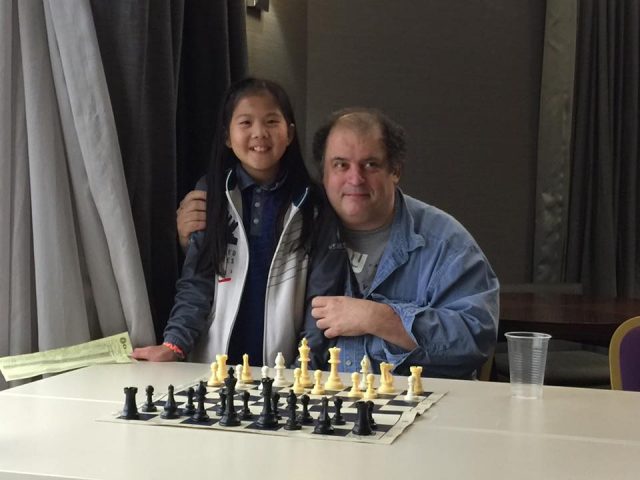 Rochelle Wu with coach GM John Fedorowicz, Photo GM Finegold
Rochelle Wu with coach GM John Fedorowicz, Photo GM FinegoldIt should also be mentioned that Rochelle has a big supporter in her chess-playing older brother Sijing who is happy to share ideas with her: “he thinks he's her coach!” There are many examples in the chess world of a younger sibling benefiting from the experience of the older one. The Open U-10 section was unsurprisingly won by Ilya Makoveev from Russia, who'd also conquered the U-8 section two years ago. This was a very interesting section to follow, and at the halfway mark it seemed that our best chances for medals were here. Things did not go as planned, but Jason Wang, Arthur Guo and Nico Chasin scored 8/11 and claimed places 5-7. Going into the final round, Jason Wang had every reason to hope for more. He already had 8/10, and the best tiebreaks of anyone in the tournament; with a win, he would've tied with Makoveev and gotten the gold. Unfortunately, the game took a wrong turn early on, as Jason got a consistently worse position that ultimatel didn't hold. I've been searching for a while now how to end this paragraph, and it finally came to mind: “present disappointments pave the way for our future successes!” A memorable moment at the closing ceremony was when Makoveev lifted up his trophy (until then the other winners had simply held it in their hands). A triumphant gesture, but it seemed to me it was not the tournament victory itself that impelled him to raise up the trophy, but the victory of winning when you're expected to win, of having successfully carried the heavy weight of all those expectations (much harder than just winning!). 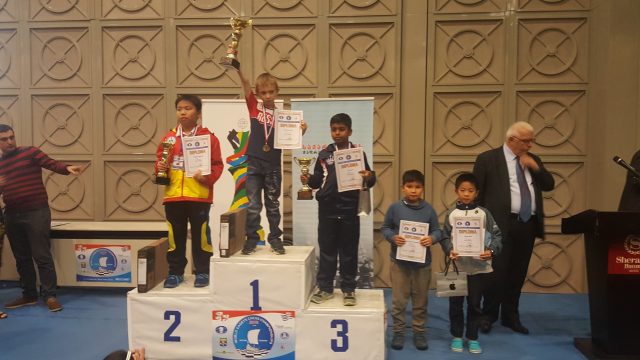 It had not been an easy tournament for Makoveev. He had made 4 draws, with all the draw offers initiated by him and each one ending the game prematurely. In three games he stood worse by varying degrees, both on the board and on the clock; in round 11, the position was equal but still contained plenty of play (here the draw guaranteed him clear first place). The first one came in round 5.
It had not been an easy tournament for Makoveev. He had made 4 draws, with all the draw offers initiated by him and each one ending the game prematurely. In three games he stood worse by varying degrees, both on the board and on the clock; in round 11, the position was equal but still contained plenty of play (here the draw guaranteed him clear first place). The first one came in round 5.
[pgn] [Event "World Cadets Championship U10B"] [Site "?"] [Date "2016.10.23"] [White "Makoveev, Ilya"] [Black "Guo, Arthur"] [Result "1/2-1/2"] [ECO "B92"] [WhiteElo "2204"] [BlackElo "2168"] [PlyCount "47"] [EventDate "2016.??.??"] 1. e4 c5 2. Nf3 d6 3. d4 cxd4 4. Nxd4 Nf6 5. Nc3 a6 6. Be2 e5 7. Nb3 Be7 8. O-O O-O 9. a4 Be6 10. Bf3 Nbd7 11. a5 Rc8 12. Be3 Qc7 13. Re1 Rfd8 14. h3 Bc4 15. Nd2 Be6 16. Re2 h6 17. Nb3 Re8 18. Rd2 Nf8 19. Bb6 Qc6 20. Nc1 Ng6 21. Nd3 Nh4 22. Nb4 Qd7 23. Kh2 Rc4 24. Nbd5 {White offered a draw having played Nb4-d5. He had about 10 minutes left to make time control while Black had more than thirty (and the better position).} (24. Nbd5 {why not continue the game with} Nxf3+ 25. Qxf3 Nxd5 26. Nxd5 Bxd5 27. exd5 Bg5 {for choice, with play both on the c-file and with the central pawn majority. Incidentally, the very next day Arthur lost to teammate Nico Chasin. My father always told me, "if you don't make the goal, the other side will."}) 1/2-1/2[/pgn]
Another striking example was in round 10. [pgn] [Event "World Cadets Championship U10B"] [Site "?"] [Date "2016.10.29"] [White "Nguyen, Quoc Hy"] [Black "Makoveev, Ilya"] [Result "1/2-1/2"] [ECO "A45"] [WhiteElo "1846"] [BlackElo "2204"] [PlyCount "44"] [EventDate "2016.??.??"] 1. d4 Nf6 2. Bg5 e6 3. Nd2 c5 4. e3 d5 5. c3 Nc6 6. Ngf3 h6 7. Bh4 Be7 8. Bd3 O-O 9. O-O b6 10. Ne5 Nxe5 11. dxe5 Nd7 12. Bxe7 Qxe7 13. f4 Bb7 14. Nf3 f5 15. exf6 Qxf6 16. Rc1 Bc6 17. Bb1 {Perhaps the worst position Makoveev had all tournament. It goes quickly downhill from here.} g6 18. Qd3 Kh7 19. h4 $1 h5 {A complete positional disaster for Black, with the light squared bishop out of play and weaknesses all around his king.} 20. Rcd1 ({ why not the direct} 20. Ng5+ Kg7 21. e4 dxe4 22. Qd6 $1) 20... Rad8 21. Rd2 Kh6 22. Rdf2 Qg7 {Diagram [#] I don't know how much time White had here, but he couldn't have been about to flag, as it's only move 22! He shows great mercy in allowing Black to painlessly get away with a draw from a nearly losing position.} (22... Qg7 23. Ne5 $1 Nxe5 24. fxe5 {with an infiltration imminent on the f6 square.}) 1/2-1/2[/pgn]
While Makoveev was likely the strongest player in the section, there's no doubt he was enormously helped by the “respect” his opponents had for him. For me, it was great to meet so many of our nation's brightest young talents (and their parents!), to watch their games, and root for their success. Go USA! Find out more about Two Sigma sponsorship here. Also see GM Irina Krush’s first piece from Batumi here and her post rest day report here. US Chess would also like to thank all the parents who helped provide content for social media and our website during this event.
Categories
Archives
- January 2026 (6)
- December 2025 (27)
- November 2025 (29)
- October 2025 (39)
- September 2025 (27)
- August 2025 (29)
- July 2025 (43)
- June 2025 (25)
- May 2025 (24)
- April 2025 (29)
- March 2025 (29)
- February 2025 (20)
- January 2025 (24)
- December 2024 (34)
- November 2024 (18)
- October 2024 (35)
- September 2024 (23)
- August 2024 (27)
- July 2024 (44)
- June 2024 (27)
- May 2024 (31)
- April 2024 (51)
- March 2024 (34)
- February 2024 (25)
- January 2024 (26)
- December 2023 (29)
- November 2023 (26)
- October 2023 (37)
- September 2023 (27)
- August 2023 (37)
- July 2023 (47)
- June 2023 (33)
- May 2023 (37)
- April 2023 (45)
- March 2023 (37)
- February 2023 (28)
- January 2023 (31)
- December 2022 (23)
- November 2022 (32)
- October 2022 (31)
- September 2022 (19)
- August 2022 (39)
- July 2022 (32)
- June 2022 (35)
- May 2022 (21)
- April 2022 (31)
- March 2022 (33)
- February 2022 (21)
- January 2022 (27)
- December 2021 (36)
- November 2021 (34)
- October 2021 (25)
- September 2021 (25)
- August 2021 (41)
- July 2021 (36)
- June 2021 (29)
- May 2021 (29)
- April 2021 (31)
- March 2021 (33)
- February 2021 (28)
- January 2021 (29)
- December 2020 (38)
- November 2020 (40)
- October 2020 (41)
- September 2020 (35)
- August 2020 (38)
- July 2020 (36)
- June 2020 (46)
- May 2020 (42)
- April 2020 (37)
- March 2020 (60)
- February 2020 (38)
- January 2020 (45)
- December 2019 (34)
- November 2019 (35)
- October 2019 (42)
- September 2019 (45)
- August 2019 (56)
- July 2019 (44)
- June 2019 (35)
- May 2019 (40)
- April 2019 (48)
- March 2019 (61)
- February 2019 (39)
- January 2019 (30)
- December 2018 (29)
- November 2018 (51)
- October 2018 (45)
- September 2018 (29)
- August 2018 (49)
- July 2018 (35)
- June 2018 (31)
- May 2018 (39)
- April 2018 (31)
- March 2018 (26)
- February 2018 (33)
- January 2018 (30)
- December 2017 (26)
- November 2017 (24)
- October 2017 (30)
- September 2017 (30)
- August 2017 (31)
- July 2017 (28)
- June 2017 (32)
- May 2017 (26)
- April 2017 (37)
- March 2017 (28)
- February 2017 (30)
- January 2017 (27)
- December 2016 (29)
- November 2016 (24)
- October 2016 (32)
- September 2016 (31)
- August 2016 (27)
- July 2016 (24)
- June 2016 (26)
- May 2016 (19)
- April 2016 (30)
- March 2016 (36)
- February 2016 (28)
- January 2016 (32)
- December 2015 (26)
- November 2015 (23)
- October 2015 (16)
- September 2015 (28)
- August 2015 (28)
- July 2015 (6)
- June 2015 (1)
- May 2015 (2)
- April 2015 (1)
- February 2015 (3)
- January 2015 (1)
- December 2014 (1)
- July 2010 (1)
- October 1991 (1)
- August 1989 (1)
- January 1988 (1)
- December 1983 (1)







